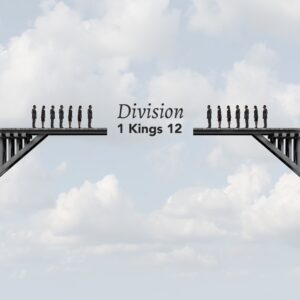1 Kings 12: Division
June 8, 2024
TODAY'S BIBLE READING:
1 Kings 12, Psalm 119:57-64, Luke 2:41-52, Ephesians 4:17-24

Rehoboam, about to be anointed king (v. 1), a day for which he must have much longed, now finds that his archrival Jeroboam has returned from Egypt and is leading a representative petition against him (v. 2-4). It must have been galling to see this Jeroboam at the head of a group of plaintiffs, arguing that Solomon’s practice of forced labor was unfair and should now be overturned.
Rehoboam must first think about it. He asks the petitioners to come back again in three days (v. 5), while all Israel holds its breath as to whether what they have now asked of their putative new king would in fact come to pass. Rehoboam goes to the advisors of his father, puts the problem to them, and gets their counsel (v. 6). These experienced political operatives basically encourage Rehoboam to acknowledge the political reality—if the people unite to ask for something, the king must either war with the people or cede to their request—and argue that if he cedes to their request, then they will actually end up serving him going forward (v. 7). A new covenant relationship, as it were, will be instituted and the people will remember how he listened to them and did not force harsher labor upon them.
However, Rehoboam also goes to the younger men, men who had grown up with him (v. 8), men that he knew well and were part of his gang and he could count on to shoot straight with him as his buddies. The challenge, of course, with advice from such quarter is that those men had no more experience, and probably significantly less, than he himself did—and certainly less than Solomon’s older advisors. Unlike David who gradually grew into his role, and unlike Solomon who was blessed with supernatural wisdom, Rehoboam is not wise enough to listen to the advice of the older counselors, and instead goes with the more choleric policy of his buddies (v. 8-15).
The choice is disastrous (v. 16-20). Israel has been in rebellion against Judah ever since, the author tells us (v. 19). When Rehoboam attempts to bring them back to heel by force, first his messenger is killed by a lynch mob (v. 18), and then God sends a prophet to tell him that the army he has assembled is pointless, for Israel’s rebellion is from God himself (v. 21-24). To Rehoboam’s credit he does listen to God (v. 24).
This turn of events was from God (v. 15, 24)—it was due to Solomon’s sin, not Rehoboam’s, and despite Rehoboam’s foolish choice, the whole eventuality was set in motion not by him, but by God, as a result of Solomon’s disloyalty to God and worship of other gods (1 Kings 11:29-39).
Well, Jeroboam, apparently in charge of the majority of God’s people, now has a problem. The center of spiritual gravity is Jerusalem, with its temple and all the rest. And so Jeroboam decides that the only way forward is to construct his own worship system to keep the people close to him and away from Judah (v. 25-33). Ominously, he intones words that are a direct reflection of that original rebellion of Israel when Moses was on the mountain: “Behold your gods, O Israel, who brought you up out of the land of Egypt” (v. 28). The extraordinary rescue of Israel from Egypt, and her extraordinary national existence, must be attributed to some supernatural origin. So Jeroboam picks the golden calves (v. 28). He makes a feast and special high days to generate a self-originated worship system to keep Israel close to him (v. 32-33).
Rehoboam acted foolishly, but the resulting division was not his fault in the end. Jeroboam not only was a divisive figure, but he led God’s people into idolatry. Neither are particularly good as a king. Let us pray to have leaders who are both wise and godly, both pious and savvy. And let us ourselves, a we lead at work, at home and at church, seek first the kingdom of God and be (as Jesus put it) innocent as doves and shrewd as serpents, too (Matt. 10:16)—godly and wise. Effective ministry, especially united effective ministry, frequently requires both attributes of wisdom and piety.
ABOUT THE AUTHOR
Josh Moody (Ph.D., University of Cambridge) is the senior pastor of College Church in Wheaton, IL., president and founder of God Centered Life Ministries, and author of several books including How the Bible Can Change Your Life and John 1-12 For You.
WANT MORE?
To receive God Centered Life devotionals directly in your inbox, as well as other resources, enter your email address in the form at the bottom of this page and click "subscribe."

